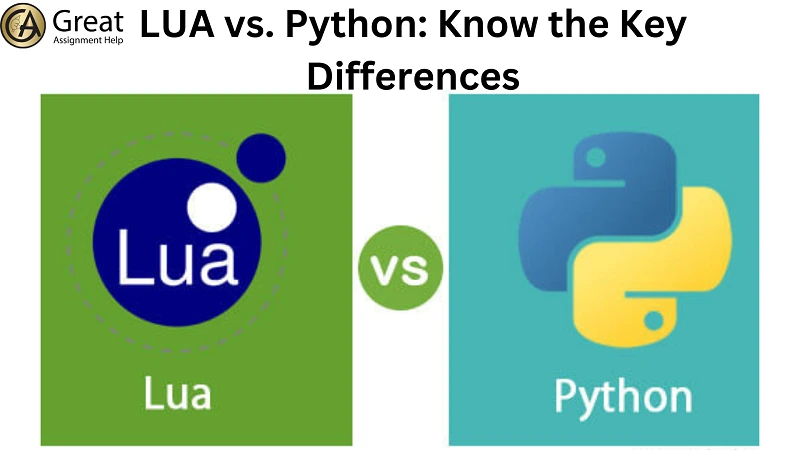In the programming world, both LUA and Python are popular languages. They both stay unique because of their features, advantages, and disadvantages. However, some beginners and those who are new to the coding field often get confused about LUA and Python. Therefore, for their better understanding, here, in this blog post, we have shared a comparative analysis of LUA vs. Python. If you are also one of those beginners, then continue reading this blog. From here, you will get to know complete details about the origins, features, pros, cons, applications, etc. of LUA and Python. Also, the comparison of LUA and Python discussed here will help you choose the perfect language for your project.
Before moving to the comparison, first, let us have a look at a brief introduction or an overview of LUA and Python.
What is LUA?
LUA is a lightweight, embeddable scripting language that is well-known for its ease of use and efficiency. It was created in the early 1990s at the Pontifical Catholic University of Rio de Janeiro (PUC-Rio) in Brazil by Roberto Ierusalimschy, Luiz Henrique de Figueiredo, and Waldemar Celes. LUA was primarily created to be used as a scripting language for video games. Furthermore, it was designed to provide a quick and simple solution for developers.
Typically, LUA is a high-level, extensible, general-purpose, and dynamic type of language that has a simple syntax with strong data description. It also has automatic memory management and garbage collection increment. As it is cross-platform, it can be embedded easily into other applications. Moreover, like Python, LUA is an open-source programming language that was built on top of the C programming language.
Some top companies that use LUA are Shopify, Unacademy, Thumbtack, etc.
What is Python?
On the other hand, Python is a strong, high-level, general-purpose programming language invented in the late 1980s by Guido van Rossum. It mainly focuses on code readability and maintainability. Hence, Python is considered a good choice for projects of any size. Moreover, the amazing syntax of Python enables developers to create short and clear code.
When compared to other programming languages, Python is a simple scripting language that is easy to learn. Also, because of its elegant syntax and readability, the code maintenance cost is low. No matter whether it is a standalone application or a scripting application, Python can be used for development. Especially, for professionals who are working in the fields of Machine Learning, Artificial Intelligence, IoT, Data Science, etc. Python is considered the first choice due to its features. Furthermore, Python also supports several packages and modules that arrive through code reuse and program modularity.
Some top companies that use Python are Uber, Facebook, Google, Netflix, etc.
LUA vs. Python: Learn the Major Differences

Generally, both LUA and Python programming languages are unique in their ways. Here, let have see in detail the differences between LUA and Python.
Also Recommend: Go vs. Rust: Know the Similarities and Differences
LUA vs. Python: Origin and Popularity
Initially, LUA was started as a research project to develop embedded systems and applications. Over time, its lightweight and user-friendly design helped it become popular and led to adoption in several sectors, including embedded devices, game development, and software like Adobe Photoshop.
Python originated from the ABC language and has earned a name after the British comedy troupe Monty Python. Guido van Rossum required a language that was both strong and simple to understand. Hence, it was developed. Python has gained more popularity as a result of its open-source nature, and it continues to develop over time. Particularly, Python is popular in web development, data analysis, machine learning, automation, and other fields.
LUA vs. Python: Syntax and Readability
The syntax of LUA is simple and understandable. Therefore, it is easy for developers to learn quickly. Mainly, to give a neat look to the source code, LUA uses “end” statements to close code blocks. However, its simplicity may not be appropriate for properly describing complicated algorithms.
Similarly, Python is also well-known for its concise and understandable syntax. However, to make the code visually appealing, Python uses indentation without the braces to define code blocks. Also, Python adheres to a “batteries-included” philosophy that provides a broad standard library for simplifying code development.
LUA vs. Python: Data Types and Structures
LUA contains only a basic collection of built-in data types such as integers, strings, and tables. Especially, tables help offer strong and associative array functionalities. However, LUA’s limited support for complex data structures might make certain jobs more difficult.
On the other hand, Python supports a diverse set of data types, including integers, floats, strings, lists, dictionaries, and more. Python’s data structure adaptability is also one of the reasons why it is so popular for handling complicated data operations.
LUA vs. Python: Resources and Community
The LUA community is enthusiastic, active, and passionate, despite being smaller than the Python community. It is well-known in the fields of game development and embedded systems. Particularly, to assist other developers, LUA enthusiasts regularly join in forums, contribute to documentation, and prepare a variety of study materials online.
But, Python’s community is undeniably one of its most powerful assets because it has a huge number of developers, enthusiasts, and specialists who actively participate in the growth and evolution of the language. The Python Package Index (PyPI) is a treasure mine of libraries and packages that provide answers to nearly every problem and make it extremely easy for developers to identify what they need.
LUA vs. Python: Speed and Performance
The simplicity of LUA contributes significantly to its exceptional speed and efficiency. It is purpose-built for high-performance workloads and hence it is an excellent choice for video game development and real-time systems.
Although Python cannot compete with LUA in terms of speed, it provides more than adequate performance for most applications. Particularly, the extensive libraries and optimizations of Python increase its adaptability and dependability, thus making it a reliable choice for a wide range of projects.
LUA vs. Python: Use Cases and Applications
LUA succeeds in the gaming sector because of its speed and tiny memory footprint. Moreover, it is extensively used in embedded systems and gaming engines such as Unity and World of Warcraft, as well as IoT devices.
But, Python’s vast scope and adaptability have led to its use in a wide range of fields such as web development, artificial intelligence, data analysis, and so on.
LUA vs. Python: Accessibility and Learning Curve
LUA is simple to learn. Therefore, it is ideal for those who are new to programming. Python is widely used because of its readable and simple syntax. Specifically, it is appealing to both novice users and developers with more years of experience.
LUA vs. Python: Library and Framework Support
LUA provides powerful libraries for game development and embedded devices, but it may fall short of Python’s huge library ecosystem in terms of breadth and depth. Python’s huge library and framework collection which includes famous ones like Django, NumPy, and TensorFlow will offer developers strong tools for dealing with a wide range of problems.
Also Recommend: Rust vs. Java: Know the Similarities and Differences
LUA vs. Python: Embedding and Extensibility
One of the biggest strengths of LUA is its easy integration with other systems and programming languages. Since it can be incorporated inside C/C++ applications, LUA is considered to be a common option for increasing software functionalities.
On the other hand, Python’s extensibility is identified by its ability to effortlessly interact with different languages and systems. Most importantly, this versatility has made Python a popular language for scripting and automation.
LUA vs. Python: Integration
The embedding features of LUA make it an ideal choice for applications that require smooth interaction with C/C++ or other languages. But, Python’s support for different interfaces, including C, C++, and Java, enables developers to simply integrate it into any existing systems and projects.
LUA vs. Python: Future Prospects
LUA’s strong position in the gaming sector and embedded systems suggests that it will continue to thrive in both areas. However, its expansion may be hampered by the advent of more complete languages in other industries.
On the other hand, the popularity and broad capabilities of Python position it for continuing growth and adaption to new technologies, maintaining its relevance for many years to come.
Pros and Cons of LUA and Python
Like other programming languages, LUA and Python also have some pros and cons. Find here, the advantages and disadvantages of LUA and Python.
Advantages of LUA
- LUA uses memory efficiently.
- It is released under an open-source license.
- In C programs, it is simple to insert.
- It is a perfect choice for game development.
- LUA is simple to use and learn.
- It is scripting, functional, and imperative.
Advantages of Python
- Python is an interpreted language.
- It contains a big library with web services, internet protocols, and string operations.
- It is also an open-source license that is free to use.
- Python is simple to learn and also has supportive guidelines.
- It contains a user-friendly data structure.
- Its run-time execution is quick.
- It is object-oriented, structured, functional, imperative, and reflective.
- Python has excellent documentation.
- It is useful for creating command line utilities.
Disadvantages of LUA
- Some of its codes must be manually coded.
- It is a new language with a tiny user or client base.
- When we define any variables, it commits an error.
- It does not support generic exception handling.
Disadvantages of Python
- Python is slower than C and C++ programming languages.
- It is not a very excellent programming language for mobile development.
- It has certain limitations for database access.
- Python is inefficient in terms of memory.
- It consumes more disk space.
- It throws a runtime error.
Also Recommend: Nim vs. Rust: Know the Major Differences
When to use LUA and Python?
LUA is the right choice for embedded systems and game development whereas Python is appropriate to use in a wide range of fields such as web development, artificial intelligence, data analysis, and so on.
Python vs. LUA: Which one is better?
Both LUA and Python are better in their ways. Especially, the distinct features of both languages made them more popular in the programming world. If you are in a dilemma about what scripting language to use for your project, then carefully read your project requirements and get a complete understanding. Getting a comprehension of your specifications will help you identify the right language for your project. Particularly, when choosing a language for your project, make sure to consider all the features of the programming language.
Python vs. LUA: Comparison Table
For your convenience, here we have presented the differences between Python and LUA in tabular form. Take a look!
| Python | LUA |
| Python is a popular, powerful, and high-level interpreted scripting language. | LUA is a scripting language that is high-level, general-purpose, extendable, and lightweight. |
| It is difficult to learn. | It is simple to learn. |
| Python supports inheritance and allows you to create classes via inheritance. | It lacks features like classes and inheritances. |
| Python provides an exception-handling system for creating more robust applications. | LUA cannot handle exceptions. |
| It contains a library extension feature. | The library that is relevant to games is not available in LUA. |
| The Speed is slow. | The Speed is faster than Python. |
| It is commonly used for scripting applications as well as standalone programs. | LUA is used for game-based or game engine-type applications. |
| It is well-known in the area of programming languages. | In comparison to Python, it is a new scripting language. |
| Python has a large community and excellent community support. | Since it is new, it lacks a huge community and strong community support. |
| Python supports macOS, Linux, and Windows version OS. | LUA supports cross-platform which is macOS, Linux, and Windows version OS. |
Also Recommend: Python vs. SQL – Know the Differences
Conclusion
Hopefully, by now, you will have understood the differences between LUA and Python. In case, you have any queries regarding the subject, call us immediately and get clarifications. Especially, by using their expertise and knowledge, the coding experts from our team will write and deliver error-free and accurate coding solutions as per your project requirements.


